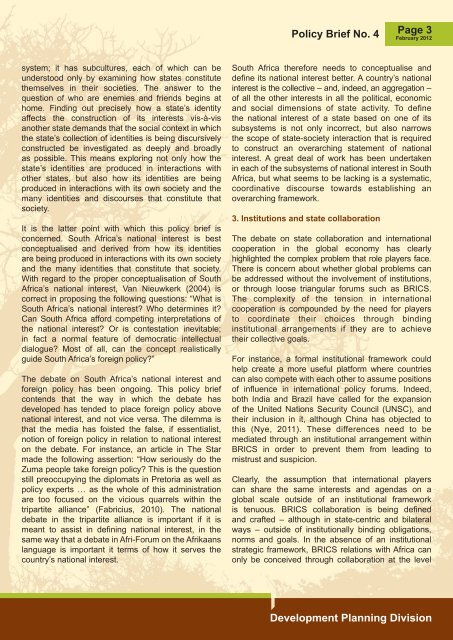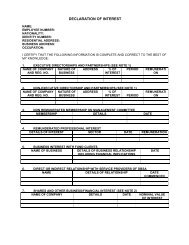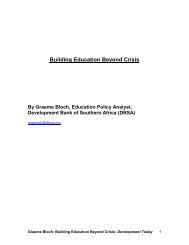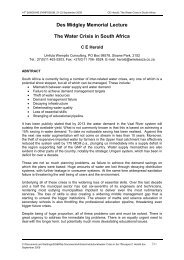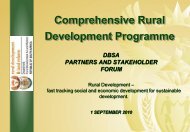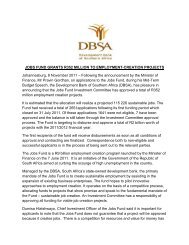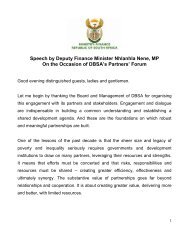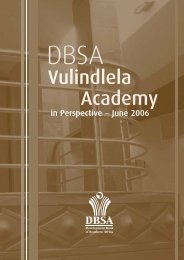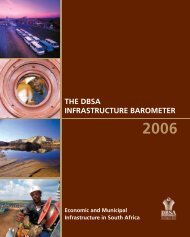South Africa's national interest and BRICS
South Africa's national interest and BRICS
South Africa's national interest and BRICS
Create successful ePaper yourself
Turn your PDF publications into a flip-book with our unique Google optimized e-Paper software.
Policy Brief No. 4 Page 3February 2012system; it has subcultures, each of which can beunderstood only by examining how states constitutethemselves in their societies. The answer to thequestion of who are enemies <strong>and</strong> friends begins athome. Finding out precisely how a state’s identityaffects the construction of its <strong>interest</strong>s vis-à-visanother state dem<strong>and</strong>s that the social context in whichthe state’s collection of identities is being discursivelyconstructed be investigated as deeply <strong>and</strong> broadlyas possible. This means exploring not only how thestate’s identities are produced in interactions withother states, but also how its identities are beingproduced in interactions with its own society <strong>and</strong> themany identities <strong>and</strong> discourses that constitute thatsociety.It is the latter point with which this policy brief isconcerned. <strong>South</strong> Africa’s <strong>national</strong> <strong>interest</strong> is bestconceptualised <strong>and</strong> derived from how its identitiesare being produced in interactions with its own society<strong>and</strong> the many identities that constitute that society.With regard to the proper conceptualisation of <strong>South</strong>Africa’s <strong>national</strong> <strong>interest</strong>, Van Nieuwkerk (2004) iscorrect in proposing the following questions: “What is<strong>South</strong> Africa’s <strong>national</strong> <strong>interest</strong>? Who determines it?Can <strong>South</strong> Africa afford competing interpretations ofthe <strong>national</strong> <strong>interest</strong>? Or is contestation inevitable;in fact a normal feature of democratic intellectualdialogue? Most of all, can the concept realisticallyguide <strong>South</strong> Africa’s foreign policy?”The debate on <strong>South</strong> Africa’s <strong>national</strong> <strong>interest</strong> <strong>and</strong>foreign policy has been ongoing. This policy briefcontends that the way in which the debate hasdeveloped has tended to place foreign policy above<strong>national</strong> <strong>interest</strong>, <strong>and</strong> not vice versa. The dilemma isthat the media has foisted the false, if essentialist,notion of foreign policy in relation to <strong>national</strong> <strong>interest</strong>on the debate. For instance, an article in The Starmade the following assertion: “How seriously do theZuma people take foreign policy? This is the questionstill preoccupying the diplomats in Pretoria as well aspolicy experts … as the whole of this administrationare too focused on the vicious quarrels within thetripartite alliance” (Fabricius, 2010). The <strong>national</strong>debate in the tripartite alliance is important if it ismeant to assist in defi ning <strong>national</strong> <strong>interest</strong>, in thesame way that a debate in Afri-Forum on the Afrikaanslanguage is important it terms of how it serves thecountry’s <strong>national</strong> <strong>interest</strong>.<strong>South</strong> Africa therefore needs to conceptualise <strong>and</strong>defi ne its <strong>national</strong> <strong>interest</strong> better. A country’s <strong>national</strong><strong>interest</strong> is the collective – <strong>and</strong>, indeed, an aggregation –of all the other <strong>interest</strong>s in all the political, economic<strong>and</strong> social dimensions of state activity. To defi nethe <strong>national</strong> <strong>interest</strong> of a state based on one of itssubsystems is not only incorrect, but also narrowsthe scope of state-society interaction that is requiredto construct an overarching statement of <strong>national</strong><strong>interest</strong>. A great deal of work has been undertakenin each of the subsystems of <strong>national</strong> <strong>interest</strong> in <strong>South</strong>Africa, but what seems to be lacking is a systematic,coordinative discourse towards establishing anoverarching framework.3. Institutions <strong>and</strong> state collaborationThe debate on state collaboration <strong>and</strong> inter<strong>national</strong>cooperation in the global economy has clearlyhighlighted the complex problem that role players face.There is concern about whether global problems canbe addressed without the involvement of institutions,or through loose triangular forums such as <strong>BRICS</strong>.The complexity of the tension in inter<strong>national</strong>cooperation is compounded by the need for playersto coordinate their choices through bindinginstitutional arrangements if they are to achievetheir collective goals.For instance, a formal institutional framework couldhelp create a more useful platform where countriescan also compete with each other to assume positionsof infl uence in inter<strong>national</strong> policy forums. Indeed,both India <strong>and</strong> Brazil have called for the expansionof the United Nations Security Council (UNSC), <strong>and</strong>their inclusion in it, although China has objected tothis (Nye, 2011). These differences need to bemediated through an institutional arrangement within<strong>BRICS</strong> in order to prevent them from leading tomistrust <strong>and</strong> suspicion.Clearly, the assumption that inter<strong>national</strong> playerscan share the same <strong>interest</strong>s <strong>and</strong> agendas on aglobal scale outside of an institutional frameworkis tenuous. <strong>BRICS</strong> collaboration is being defi ned<strong>and</strong> crafted – although in state-centric <strong>and</strong> bilateralways – outside of institutionally binding obligations,norms <strong>and</strong> goals. In the absence of an institutionalstrategic framework, <strong>BRICS</strong> relations with Africa canonly be conceived through collaboration at the levelDevelopment Planning Division


